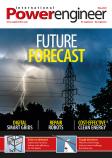A new UK group has been formed to ensure that networks are ready to meet the significant challenges of low carbon generation technologies and new requirements such as electric vehicle charging, wind and solar generation, and heat pumps in homes. From both engineering and business perspectives, it is now recognised that a ‘whole system’ approach is required to address these new challenges.
The Institution of Engineering and Technology (IET) has brought together the panel of experts from transmission & distribution network companies, consultants, academia, the regulator and government with practical experience of both the operation and the planning of today’s electricity system. This work is being undertaken in close association with other industry groups including the Smart Grid Forum and the Electricity Network Strategy Group.
The aim of the Power Networks Joint Vision expert group is to assist in building an integrated perspective for the planning and operation of the future electricity network, ensuring not only technical performance but also opportunities for jobs and exports are identified at an early stage. The group will identify the issues, define the questions to be answered, clarify the parties accountable, and highlight areas of relevance to national policy-making.
This work is a starting point for building knowledge and confidence, ensuring that the significant engineering changes ahead for our national electricity system can be met without risk to supply security and resilience.
The chair of the expert group, IET Fellow Dr Simon Harrison, said: “The changes needed across the nation’s power networks are huge and it is becoming evident that a ‘one system’ approach is vital. Decarbonisation of energy is probably the biggest peace-time change to national infrastructure that GB will have ever seen. The stakes are high in terms of ensuring the future stability of the grid whilst creating a system that can deal with two-way power flows and less-predictable generation and demands.
“In the future, demand peaks will be less-predictable, due to requirements, such as electric car charging, and this will require a transmission and distribution grid that interacts more closely with consumers and can stagger peaks in power flow, whilst still satisfying everyone’s requirements. We are working to help the government and network operators by creating a forum that allows a frank and open exchange of information and concerns, and shares learning and insights within the industry while driving forward the massive changes required.”
The IET believes it is vital to have a joined-up approach to the design of the future GB power infrastructure. It is in the interest of all stakeholders that future grid development is holistic and achieves secure and economic outcomes while responding to a number of entirely new and less predictable requirements.
This work will assist the government in lowering carbon emissions, making more efficient use of the UK’s resources, and identifying new opportunities for jobs and exports.
For more information, visit www.theiet.org
















